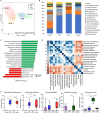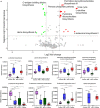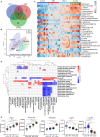Metagenomic and metabolomic analyses reveal synergistic effects of fecal microbiota transplantation and anti-PD-1 therapy on treating colorectal cancer
- PMID: 35911731
- PMCID: PMC9336524
- DOI: 10.3389/fimmu.2022.874922
Metagenomic and metabolomic analyses reveal synergistic effects of fecal microbiota transplantation and anti-PD-1 therapy on treating colorectal cancer
Abstract
Anti-PD-1 immunotherapy has saved numerous lives of cancer patients; however, it only exerts efficacy in 10-15% of patients with colorectal cancer. Fecal microbiota transplantation (FMT) is a potential approach to improving the efficacy of anti-PD-1 therapy, whereas the detailed mechanisms and the applicability of this combination therapy remain unclear. In this study, we evaluated the synergistic effect of FMT with anti-PD-1 in curing colorectal tumor-bearing mice using a multi-omics approach. Mice treated with the combination therapy showed superior survival rate and tumor control, compared to the mice received anti-PD-1 therapy or FMT alone. Metagenomic analysis showed that composition of gut microbiota in tumor-bearing mice treated with anti-PD-1 therapy was remarkably altered through receiving FMT. Particularly, Bacteroides genus, including FMT-increased B. thetaiotaomicron, B. fragilis, and FMT-decreased B. ovatus might contribute to the enhanced efficacy of anti-PD-1 therapy. Furthermore, metabolomic analysis upon mouse plasma revealed several potential metabolites that upregulated after FMT, including punicic acid and aspirin, might promote the response to anti-PD-1 therapy via their immunomodulatory functions. This work broadens our understanding of the mechanism by which FMT improves the efficacy of anti-PD-1 therapy, which may contribute to the development of novel microbiota-based anti-cancer therapies.
Keywords: Bacteroides; anti-PD-1 therapy; colorectal cancer; fecal microbiota transplantation; immunotherapy.
Copyright © 2022 Huang, Zheng, Kang, Hao, Mao, Zhang, Chen, Tan, He, Zhao and Yin.
Conflict of interest statement
Authors XZ, HH, YT and YY are employed by Xbiome Biotech Co. Ltd. The remaining authors declare that the research was conducted in the absence of any commercial or financial relationships that could be construed as a potential conflict of interest.
Figures




Similar articles
-
Pectin supplement significantly enhanced the anti-PD-1 efficacy in tumor-bearing mice humanized with gut microbiota from patients with colorectal cancer.Theranostics. 2021 Feb 19;11(9):4155-4170. doi: 10.7150/thno.54476. eCollection 2021. Theranostics. 2021. PMID: 33754054 Free PMC article.
-
Effect of fecal microbiota transplantation in patients with slow transit constipation and the relative mechanisms based on the protein digestion and absorption pathway.J Transl Med. 2021 Dec 1;19(1):490. doi: 10.1186/s12967-021-03152-2. J Transl Med. 2021. PMID: 34852831 Free PMC article.
-
Fecal Microbiota Transplantation Prevents Intestinal Injury, Upregulation of Toll-Like Receptors, and 5-Fluorouracil/Oxaliplatin-Induced Toxicity in Colorectal Cancer.Int J Mol Sci. 2020 Jan 8;21(2):386. doi: 10.3390/ijms21020386. Int J Mol Sci. 2020. PMID: 31936237 Free PMC article.
-
A viable remedy for overcoming resistance to anti-PD-1 immunotherapy: Fecal microbiota transplantation.Crit Rev Oncol Hematol. 2024 Aug;200:104403. doi: 10.1016/j.critrevonc.2024.104403. Epub 2024 Jun 3. Crit Rev Oncol Hematol. 2024. PMID: 38838927 Review.
-
Therapeutic methods of gut microbiota modification in colorectal cancer management - fecal microbiota transplantation, prebiotics, probiotics, and synbiotics.Gut Microbes. 2020 Nov 1;11(6):1518-1530. doi: 10.1080/19490976.2020.1764309. Epub 2020 May 26. Gut Microbes. 2020. PMID: 32453670 Free PMC article. Review.
Cited by
-
The Gut Microbiome from a Biomarker to a Novel Therapeutic Strategy for Immunotherapy Response in Patients with Lung Cancer.Curr Oncol. 2023 Oct 24;30(11):9406-9427. doi: 10.3390/curroncol30110681. Curr Oncol. 2023. PMID: 37999101 Free PMC article. Review.
-
The impact of the gut microbiome on tumor immunotherapy: from mechanism to application strategies.Cell Biosci. 2023 Oct 13;13(1):188. doi: 10.1186/s13578-023-01135-y. Cell Biosci. 2023. PMID: 37828613 Free PMC article. Review.
-
Gut microbiota and gastrointestinal tumors: insights from a bibliometric analysis.Front Microbiol. 2025 Apr 8;16:1558490. doi: 10.3389/fmicb.2025.1558490. eCollection 2025. Front Microbiol. 2025. PMID: 40264971 Free PMC article.
-
Global research on the crosstalk between intestinal microbiome and colorectal cancer: A visualization analysis.Front Cell Infect Microbiol. 2023 Mar 15;13:1083987. doi: 10.3389/fcimb.2023.1083987. eCollection 2023. Front Cell Infect Microbiol. 2023. PMID: 37009513 Free PMC article.
-
Gut Microbiota Reshapes the Tumor Microenvironment and Affects the Efficacy of Colorectal Cancer Immunotherapy.Cancer Med. 2025 Jun;14(12):e70994. doi: 10.1002/cam4.70994. Cancer Med. 2025. PMID: 40530896 Free PMC article. Review.
References
Publication types
MeSH terms
LinkOut - more resources
Full Text Sources
Medical

